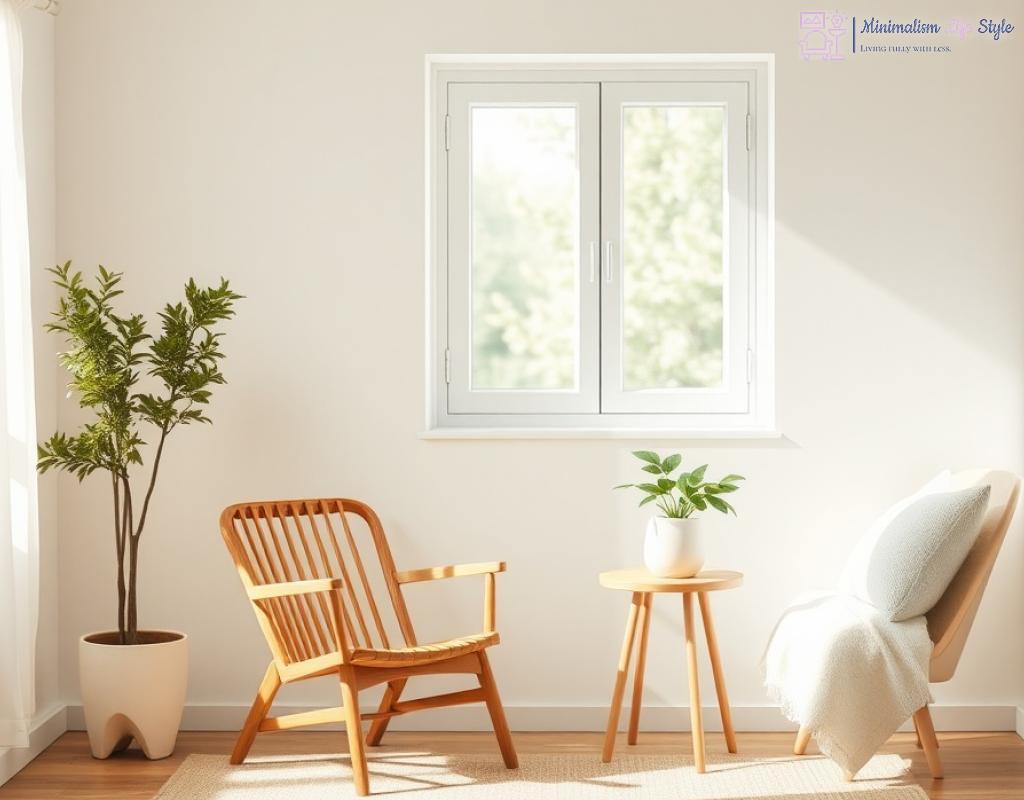Embrace Simplicity: The Power of Minimalist Living

Redefining Wealth in Simplicity
In a world obsessed with accumulation, the minimalist movement invites us to reconsider what it means to live richly. By shedding excess, we can focus on what truly matters—our health, relationships, and well-being. Embracing a minimalist lifestyle not only declutters our physical space but also clears our minds, paving the way for healthier aging. Imagine a life where less is more, where joy is found in experiences rather than possessions.
Minimalist Habits for a Vibrant Life
Integrating minimalist habits into our daily routines can significantly impact our longevity and quality of life. These habits encourage mindfulness, reduce stress, and promote physical health. Here are some powerful minimalist habits to embrace:
- Mindful Eating: Focus on whole, nutrient-rich foods rather than processed options. This not only nourishes your body but cultivates a deeper relationship with your meals.
- Declutter Your Environment: A tidy space fosters a tidy mind. Regularly decluttering your surroundings can lead to reduced anxiety and increased focus.
- Prioritize Movement: Rather than committing to rigid workout schedules, find ways to incorporate movement into your daily life—take walks, dance, or engage in activities you love.
- Limit Digital Distractions: Unplug from technology regularly to reconnect with nature and yourself. This can enhance mental clarity and emotional well-being.
- Foster Meaningful Connections: Invest your time in relationships that bring you joy and support. Quality over quantity is key to emotional health.
The Impact of Minimalism on Aging
Adopting a minimalist lifestyle can have profound effects on how we age. Research shows that simplifying our lives can lead to lower stress levels, which is crucial in preventing age-related diseases. Furthermore, minimalism encourages us to engage in activities that promote both physical and mental wellness. Here’s a quick overview of the benefits:
| Benefit | Description |
|---|---|
| Reduced Stress | Less clutter leads to a more peaceful environment, promoting relaxation and mental clarity. |
| Enhanced Focus | Fewer distractions allow for deeper engagement in meaningful activities. |
| Better Physical Health | Mindful habits often lead to healthier eating and increased physical activity. |
| Improved Relationships | More time for quality interactions enhances emotional health and longevity. |
Mindful Eating: Nourishment for Longevity
Rediscovering the Essence of Food
In our fast-paced lives, meals often become just another item on our to-do lists. However, adopting a minimalist mindset towards eating can transform this routine into a nourishing ritual that supports longevity. Mindful eating encourages us to reconnect with our food, appreciating its origins and the sustenance it provides. This practice not only enhances our relationship with what we consume but also aligns with the principles of minimalism—valuing quality over quantity.
Choosing Nutrient-Dense Foods
To truly nourish our bodies, it’s essential to focus on foods that are rich in nutrients rather than empty calories. By prioritizing whole, unprocessed foods, we can significantly improve our health outcomes. The following list highlights some key nutrient-dense food groups that can form the backbone of a healthy, minimalist diet:
- Fruits and Vegetables: Fresh produce is packed with vitamins, minerals, and antioxidants.
- Whole Grains: Opt for quinoa, brown rice, and oats to increase fiber intake.
- Healthy Fats: Incorporate avocados, nuts, and olive oil for heart health.
- Lean Proteins: Choose beans, lentils, and lean meats for muscle maintenance.
- Fermented Foods: Foods like yogurt and sauerkraut can enhance gut health.
Practicing Mindfulness at Mealtime
Mindful eating is not just about what we eat; it’s also about how we eat. Taking the time to savor each bite can lead to greater satisfaction and prevent overeating. Here are some effective strategies to incorporate mindfulness into your meals:
- Reduce Distractions: Turn off the TV and put away your phone while eating. This allows you to focus entirely on your food.
- Chew Slowly: Take time to chew thoroughly, which aids digestion and helps you appreciate flavors.
- Listen to Your Body: Pay attention to hunger cues and stop eating when you feel satisfied, rather than stuffed.
By simplifying our eating habits and embracing mindful practices, we can not only enhance our physical health but also enrich our overall quality of life, making our journey through aging a more fulfilling experience.
Movement Matters: Easy Ways to Stay Active
In the quest for healthy aging, movement emerges as a vital component that many overlook in their daily routines. As we navigate through life, our bodies require regular activity not only to maintain physical health but also to enhance mental clarity and emotional well-being. Embracing a minimalist approach to staying active means we can simplify our movement practices, making them more enjoyable and integrated into our daily lives.
Transforming Mundane Tasks into Movement Opportunities
It’s easy to fall into the trap of thinking that exercise must occur in a gym or through structured workouts. However, by rethinking our daily activities, we can discover numerous opportunities for physical engagement. For instance, consider incorporating movement into your chores—cleaning the house, gardening, or even cooking can become a form of exercise if you approach them with intention. This shift allows you to stay active without the pressure of formal exercise sessions, aligning perfectly with the minimalist philosophy of reducing unnecessary complexity.
The Joy of Mindful Movement
Mindful movement is about being present in your body while engaging in physical activities. This approach encourages you to listen to your body and participate in movements that feel good and invigorating. Whether it’s dancing in your living room, taking a leisurely stroll in nature, or practicing yoga, the key is to focus on enjoyment rather than obligation. Movement doesn’t have to be a chore; it can be a delightful expression of vitality that enriches your life. By prioritizing activities that bring joy, you create a sustainable routine that nurtures both body and spirit.
Community and Connection through Movement
Another essential aspect of staying active is the social dimension of movement. Engaging in physical activities with friends or family can enhance motivation and make the experience more rewarding. Consider joining a local walking group, participating in community dance classes, or simply inviting loved ones to join you for a hike. These social interactions not only motivate you to stay consistent with your activity levels but also strengthen your relationships, ultimately contributing to overall well-being. By fostering connections through movement, you weave a rich tapestry of experiences that support your journey towards healthy aging.
Stress Less: Minimalist Mindfulness Techniques
Unraveling the Knots of Anxiety
In today’s fast-paced world, where distractions abound and commitments pile up, stress can often feel like an unavoidable companion. However, incorporating minimalist mindfulness techniques into our lives can be a powerful antidote to this pervasive issue. By focusing on simplicity and intentionality, we can cultivate a more peaceful existence that not only enhances our mental clarity but also significantly contributes to healthy aging. The goal is to create a sanctuary within ourselves where stress holds no power, allowing us to thrive rather than merely survive.
Embracing the Art of Presence
Mindfulness is not just a buzzword; it’s a transformative practice that encourages us to live in the moment. When we embrace the art of presence, we become more attuned to our thoughts and feelings, fostering a sense of peace that can combat stress. This technique can be seamlessly integrated into daily life. Picture yourself taking a few moments to breathe deeply, feeling each inhale and exhale. This simple act grounds you, pulling you away from the chaos and anchoring you in the here and now. By cultivating this awareness, we can better manage stressors, granting ourselves the clarity needed for a fulfilling life.
Creating Rituals of Calm
Incorporating minimalist mindfulness into our routines can be as simple as establishing rituals that bring us calm and joy. Whether it’s a morning coffee savored in silence or an evening walk to appreciate nature, these moments serve as precious pauses in our day. The key is to focus on quality over quantity; a few meaningful minutes can outweigh hours spent in a haze of distractions. Moreover, these rituals not only reduce stress but also enhance our overall well-being, making them crucial components of a holistic approach to healthy aging. By intentionally crafting these moments, we foster an environment where stress is diminished and joy is amplified, setting the stage for longevity.
Social Connections: Cultivating Meaningful Relationships
The Essence of Connection in a Minimalist Lifestyle
In the pursuit of healthy aging, the significance of social connections cannot be overstated. As we embrace a minimalist approach to life, it becomes clear that the quality of our relationships profoundly influences our overall well-being. Cultivating meaningful relationships is not merely an addition to our lives; it is a fundamental pillar that supports emotional health, resilience, and longevity. In a world increasingly tethered to screens, the challenge lies in fostering genuine connections that enrich our lives and nourish our spirits.
Nurturing Relationships Over Accumulating Contacts
As we navigate through life, it is tempting to equate a wide social circle with richness in relationships. However, minimalism teaches us to prioritize depth over breadth. This shift in mindset encourages us to invest time and energy into relationships that uplift us and align with our values. Fostering a few close bonds, rather than spreading ourselves thin among many acquaintances, often leads to deeper emotional fulfillment. Imagine sharing your thoughts and feelings with a trusted friend who truly understands you, rather than engaging in superficial conversations with numerous individuals. This authentic connection not only supports mental wellness but can also contribute to healthier aging.
Creating Spaces for Genuine Interaction
The environment we cultivate for our social interactions plays a crucial role in the quality of our relationships. By simplifying our social settings, we can create spaces that foster genuine connection. Consider hosting intimate gatherings, where the focus is on deep conversations rather than large parties filled with small talk. Engage in activities that allow for meaningful exchanges, such as cooking together, taking walks, or enjoying a shared hobby. These moments build memories and strengthen bonds, creating a supportive network that nurtures both emotional and physical health. Moreover, the intention behind these gatherings matters—when we approach our interactions with mindfulness and care, we set the stage for relationships that last and thrive.




